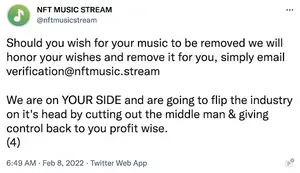Also like HitPiece, NFT Music Stream claimed to be doing artists a favor, tweeting, "We are on YOUR SIDE and are going to flip the industry on it's[sic] head by cutting out the middle man & giving control back to you profit wise." They also wrote, "I think a lot of people are missing the point of the project", apparently not understanding why musicians might be less than thrilled to see their work resold without permission.
Another project tries to sell music NFTs without permission from artists
EarnHub claims they've been hacked for around $284,000
NFT marketplace Cent shuts down over "rampant" fakes and plagiarism, founder says "I think this is a pretty fundamental problem with Web3"
Ubisoft holds internal workshop to address major employee concerns about NFTs, delivers celebratory NFT to employees
Meanwhile, Ubisoft announced that they were creating a celebratory virtual hat NFT to gift to their employees in early March, in honor of the opening of the Ubisoft Quartz NFT platform. Maybe just give them a cash bonus next time.
The team behind Doodled Dragons rugpulls again with "Balloonsville", taunts buyers and the NFT platform they used
UN reports that millions of dollars in stolen crypto have gone towards funding North Korean missile programs
Contracted developer makes off with all the funds for the Ratz Club NFT project
- Tweet by Zilverk (in Spanish)
- Medium post by Ratz Club
ENS governance put to the test as a bigoted 2016 tweet from its director of operations resurfaces
On February 6, the ENS community stewards voted to remove Millegan from among them, and the following day the nonprofit behind ENS announced that they had terminated Millegan's contract as director of operations. As of February 7, Millegan still holds the largest share of voting power in the ENS DAO.
Meter Passport, another blockchain bridge, is exploited for $4.3 million
Trader trying to cash out their rewards from a DeFi platform loses more than $35,000 to a Twitter support scammer
The trader reported that they lost more than $35,000. They wrote in a Reddit post, "I was unemployed and literally solely yield farming to hedge my student loan. I deposited almost the same amount of my debt, and was leveraging the fact that the return I was getting was higher than my loan's APR. While trying to earn $8-9 more, I lost $35k and my financial freedom."
- "I just lost over $35k to scammers. Beware out there." post on r/defi







